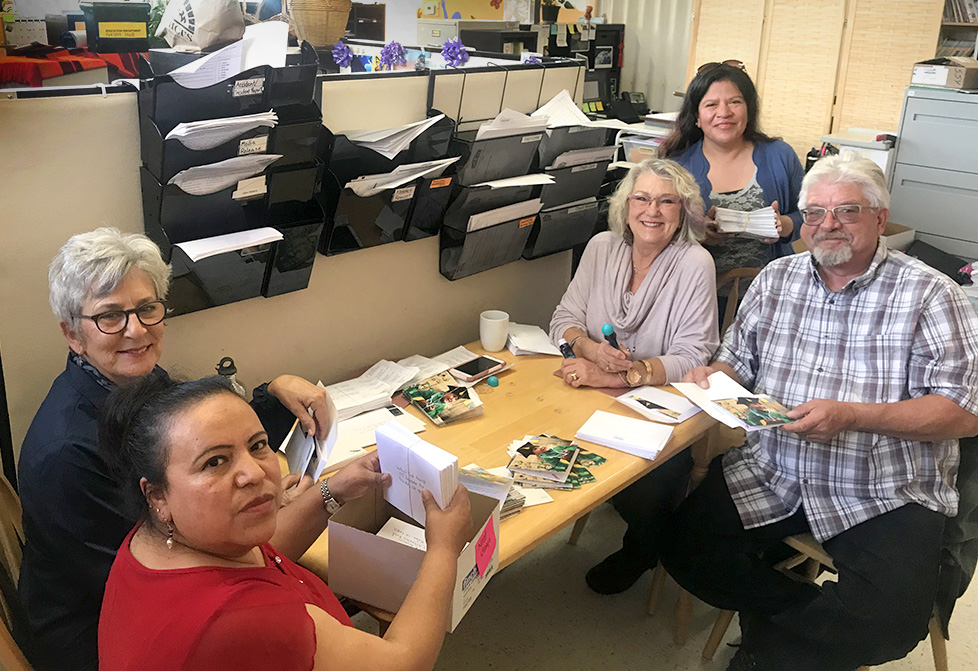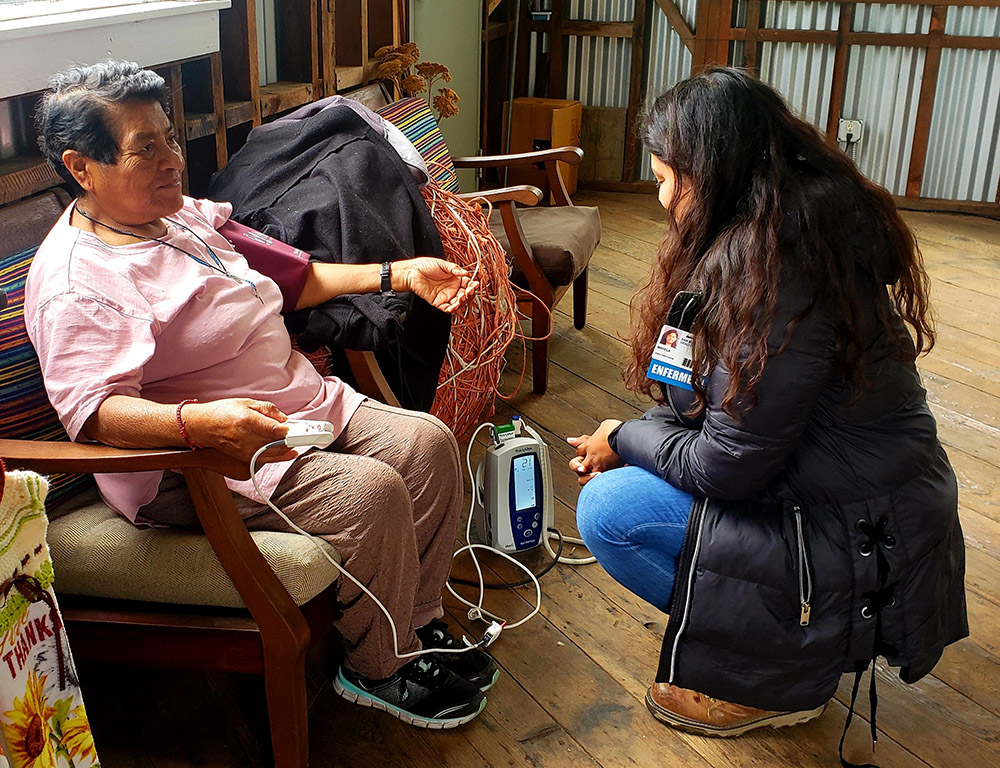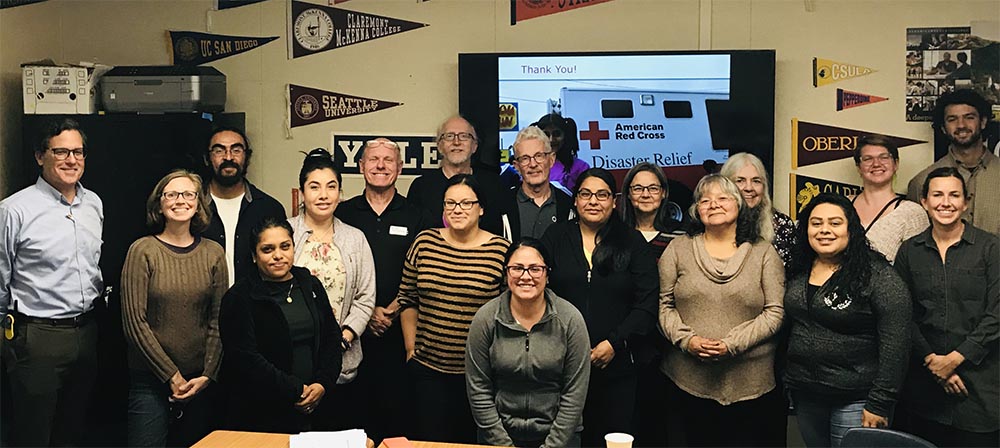
Volunteers are at the heart of Puente’s work
The holidays are a very busy time at Puente. It is a time when local families have to cover not only the usual cost-of-living expenses in one of the most costly areas in the country, but also need to buy groceries for holiday festivities and gifts for their children. Each year, Puente raises funds to provide $50 gift cards to these families to help hundreds deal with the economic pressure so many face in the Bay Area at this time of year. Puente’s winter distribution efforts also assist hundreds of farmworkers who receive warm clothes for the cold winter months.
The success of Puente’s biggest fundraising drive of the year would be impossible without the help of its volunteers, who generously show up to stuff, address and stamp envelopes. And frequently, its volunteers are simultaneously Puente participants.
That’s true for Elvira and Dina Medrano, sisters who live together with their husbands and children on a ranch south of Pescadero. The Medrano sisters are cheerful women who hail from Nayarit, Mexico. This December, they showed up to help Puente in four-hour shifts.
It’s been a challenging time for Elvira and Dina, who were laid off from Bay City Flower Nursery when it closed its doors this fall.
“I felt bored at home, so I thought I might want to volunteer,” says Elvira. She’s already done three shifts with Puente, and says, with a laugh, that it makes her feel “like a secretary.”
“To me, it’s an easy job. Where I used to work, the job was heavy and difficult. I worked with dirt and in greenhouses with a pesticide smell, moving plants from one place to another.”
Dina was grateful for the chance to feel useful. “I felt satisfied doing this work. I almost felt like I had a job,” she says. “If I had been sitting at home, I would have been stressing about getting a job.”
Both sisters have built a long-term relationship with Puente. They’ve taken ESL classes, done Zumba, attended workshops on blood pressure, parenting, and immigration, and contributed to Día de los Muertos. As they got older, both of Elvira’s daughters joined thePuente youth program. “That was a great help. It was their first job,” she says.
For both women, it felt natural to give back to an organization that has touched so many aspects of their lives. “I’m very grateful to Puente. Going to church, I’ve learned that we’re also here to serve, not just to be served,” adds Elvira, while Dina nodded.
Puente counts on volunteers for all its core programs today. Puente has 31 staff, and some 300 dedicated volunteers, says Rita Mancera, Executive Director of Puente.
“The expertise, the time, the generosity – I think the organization couldn’t run without them,” she says. “All of our volunteers are good people. We call them, and they answer.”
Volunteers assist in running complex events. They mentor local students, they help oversee the childcare program, they participate in the popular exchange program, Cafecito and Café Night, and they stuff envelopes. That’s only a partial list.
Karen Walker showed up to stuff envelopes on a recent Monday morning. She is a serial Puente volunteer, having taught adult ESL there for five years. She still volunteers with Cafecito, a program she helped pioneer. She also regularly volunteers at Puente events like the Posada last year, where she helped make tamales.
She has helped three local residents attain their US citizenship through one-on-one citizenship tutoring, – something she takes pride in.
“There’s no government here, there’s nothing… so Puente fills a lot of gaps,” she says.
Walker moved to Pescadero 15 years ago and got involved with Puente out of a thirst to connect with her community. “I didn’t know anybody, and now I know so many people here, because of teaching,” she says. She is still connected with her former students and knows them by name. She inquires after their spouses and children.
Puente is the kind of place where even the smallest contributions of volunteer time make a clear, immediate difference in people’s lives. And it’s a place where all financial contributions, large and small, are acknowledged with a thank-you note.
Gayle and Guido Ciardi have been Puente donors and volunteers for five years, when they moved to Half Moon Bay from over the hill. They joined Karen Walker around the Puente kitchen table for a recent shift, stuffing envelopes and chatting away.
The couple first became aware of Puente when they saw a notice in the Half Moon Bay Review about a need for gloves and other warm winter clothes.
“We’d driven by workers in the winter, when it was cold out and dark – it would make me feel bad to think of them working through those conditions,” says Gayle.
That first year, they bought some gloves, rain gear and flashlights for the male farm workers in Puente’s service area. But for the past three years running, Gayle has taken to knitting scarves for men and women farmworkers – an astonishing 75 to 100 scarves over a span of three years.
The Ciardis come to Puente several times a year to help with mail campaigns. They have also come to Puente’s backpack drive event to guide the youngest children as they pick out school supplies. And they donated some school supplies as well.
The couple enjoys getting a peek into an organization they strongly support. Most of all, they enjoy being useful.
“It makes me feel good that I’m contributing to my community. But like any volunteer work, I’m getting more out of it then I’m contributing,” says Guido, with a smile.
“I like to see our diverse group of volunteers meet each other, work alongside in the kitchen, laugh while addressing envelopes, get familiar with Puente staff. Is a gift to bring people together”. Adds Mancera.
If you are interested in supporting Puente by becoming a volunteer, please contact Vicente Lara, Program Director at 650.262.7080.
Los voluntarios están en el corazón de las obras de Puente.
Las vacaciones son un momento muy ocupado en Puente. Es un momento decisivo para las familias locales, que dependen de tarjetas de regalo donadas de $50 para comprar regalos para sus hijos, y para los trabajadores agrícolas, que necesitan ropa abrigada para hacer frente a los fríos, lluviosos y oscuros meses de invierno.
Hacer correr la voz sobre las donaciones del fin de año de Puente sería imposible sin sus voluntarios, que se presentan generosamente para rellenar y enviar sobres. Y con frecuencia, sus voluntarios son simultáneamente participantes de Puente.
Eso es cierto para Elvira y Bernardina (conocido como Dina) Medrano, hermanas que viven juntas en una casa móvil con sus esposos e hijos en un rancho al sur de Pescadero. Las hermanas Medrano son mujeres alegres que provienen de Nayarit, México. Este diciembre, se presentaron para ayudar en Puente en turnos de cuatro horas.
Ha sido un momento difícil para Elvira y Dina, que fueron descansadas de Bay City Flower Nursery cuando la florería cerró sus puertas este otoño.
“Me sentía aburrida en casa, así que pensé que podría ser voluntario,” dice Elvira. Ya ha hecho tres turnos con Puente y dice, con una sonrisa, que la hace sentir “como una secretaria.”
“Para mí, es un trabajo fácil. Donde solía trabajar, el trabajo era pesado y difícil. Trabajé con tierra y en invernaderos con olor a pesticida, moviendo plantas de un lugar a otro.”
Dina agradeció la oportunidad de sentirse útil. “Me sentí satisfecho haciendo este trabajo. Casi sentí que tenía un trabajo,” dice ella. “Si hubiera estado sentado en casa, habría estado estresado por conseguir un trabajo.”
Ambas hermanas han construido una relación a largo plazo con Puente. Tomaron clases de ESL, hicieron Zumba, asistieron a talleres sobre presión arterial, crianza de los hijose inmigración, y contribuyeron a Dìa de los Muertos. A medida que crecían, las dos hijas de Elvira se unieron al programa juvenil Puente. “Eso fue de gran ayuda. Fue su primer trabajo,” dice ella.
Para ambas mujeres, se sintió natural devolver a una organización que ha tocado tantos aspectos de sus vidas. “Estoy muy agradecido con Puente. Al ir a la iglesia, aprendí que también estamos aquí para servir, no solo para ser servidos,” agrega Elvira, mientras que Dina asintió.
Puente cuenta hoy con voluntarios para todos sus programas principales. Puente tiene 31 empleados y unos 300 voluntarios dedicados, dice Rita Mancera, Directora Ejecutiva de Puente.
“La experiencia, el tiempo, la generosidad. Creo que la organización no podría funcionar sin ellos,” dice. “Todos nuestros voluntarios son buenas personas. Los llamamos y ellos responden.
Voluntarios ayudan a organizar eventos complejos. Son mentores de los estudiantes locales, ayudan a supervisar el programa de cuidado de niños, participan en programas como Cafecito y Noche de Estación y llenan sobres. Esa es solo una lista parcial.
Karen Walker apareció ayudar a llenar sobres el lunes por la mañana. Ella es una voluntaria en serie de Puente, que enseñó ESL para adultos allí durante cinco años. Ella todavía es voluntaria en Cafecito, un programa que ayudó a ser pionera. También fue voluntaria en eventos como la Posada de Puente, donde ayudó a hacer tamales.
Ella ha “ayudado a crecer” a tres nuevos ciudadanos estadounidenses a través de tutorías de ciudadanía individuales, como ella lo expresa, algo de lo que se enorgullece.
“No hay gobierno aquí, no hay nada … así que Puente llena muchos vacíos,” dice ella.
Walker se mudó a Pescadero hace 15 años y se involucró con Puente por la sed de conectarse con su comunidad. “No conocía a nadie, y ahora conozco a tanta gente aquí, debido a la enseñanza,” dice ella. Ella todavía está conectada con sus antiguos alumnos y los conoce por su nombre. Ella pregunta por sus cónyuges e hijos.
Puente es el tipo de lugar donde incluso las contribuciones más pequeñas de tiempo voluntario marcan una diferencia clara e inmediata en la vida de las personas. Y es un lugar donde todas las contribuciones financieras, grandes y pequeñas, se reconocen con una nota de agradecimiento.
Gayle y Guido Ciardi han sido donantes y voluntarios de Puente durante cinco años, cuando se mudaron a Half Moon Bay desde la colina. Se unieron a Karen Walker alrededor de la mesa de la cocina de Puente para un turno reciente, llenando sobres y charlando.
La pareja se dio cuenta por primera vez de Puente cuando vieron un aviso en Half Moon Bay Review sobre la necesidad de guantes y otras prendas abrigadas de invierno.
“Habíamos sido conducidos por trabajadores en el invierno, cuando hacía frío y estaba oscuro; me haría sentir mal pensar en ellos trabajando en esas condiciones,” dice Gayle.
Ese primer año, compraron algunos guantes, ropa de lluvia y linternas para los trabajadores agrícolas varones en el área de servicio de Puente. Pero durante los últimos tres años consecutivos, Gayle se ha dedicado a tejer bufandas para hombres y mujeres trabajadores agrícolas, unas asombrosas bufandas de 75 a 100 en un lapso de tres años.
Los Ciardis vienen a Puente varias veces al año para ayudar con las campañas por correo. También han venido al evento de conducción de mochilas de Puente para guiar a los niños más pequeños mientras seleccionan los útiles escolares. Un año también donaron algunos útiles escolares.
A la pareja le gusta echar un vistazo a una organización que apoyan firmemente. Sobre todo, les gusta ser útiles.
“Me hace sentir bien que estoy contribuyendo a mi comunidad. Pero como cualquier trabajo voluntario, estoy obteniendo más de lo que estoy contribuyendo “, dice Guido, con una sonrisa.
“Me gusta ver a nuestro grupo diverso de voluntarios reunirse, trabajar juntos en la cocina, reír mientras se dirigen a los sobres, familiarizarse con el personal de Puente. Es un regalo para unir a las personas. ” Agrega Mancera.
Si está interesado en apoyar a Puente convirtiéndose en voluntario, comuníquese con Vicente Lara, Director del Programa al 650.262.7080.






